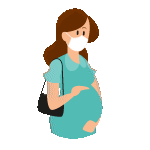Pregnancy is a beautiful and life-changing journey, filled with moments of joy, excitement, and yes, a little bit of apprehension. Every month brings something new, whether it’s a tiny growth spurt or a whole new feeling in your body. By the time you hit the third month, you're well past the early stages, and your body is starting to show what it’s made of. You're getting used to the idea of growing a little human.
From adapting to the physical changes in your body to learning about your baby’s development, the third month is a crucial time to pay attention to both your physical and emotional well-being. Here’s everything you can expect in the third month of pregnancy, including a week-by-week breakdown, tips on nutrition, common misconceptions, and lifestyle changes.
What to Expect in Your Third Month
The third month of pregnancy marks the end of the first trimester. For many women, the third month is when early pregnancy symptoms, such as nausea and fatigue, begin to subside, and the excitement of the pregnancy journey becomes more tangible. However, it’s also a time when many new feelings and thoughts emerge, especially for first-time mothers.
As you progress, you may also start to share your pregnancy news with family and friends, which can bring a new wave of excitement and support. It’s a time to reflect on your journey so far and look forward to the growth of your baby in the coming months.
Week-by-Week Tracking of Baby Development in Your Third Month
Visual of the tracker (login part) from: https://www.mamypoko.co.in/pregnancy-calculator
Now that you’re in your third month of pregnancy, let’s dive deeper into what’s happening inside your body and how your little one is developing. To help you stay informed about your pregnancy, we’ve introduced the MamyPoko Pants Pregnancy Tracker. This tool provides personalized updates based on your last menstrual period or expected due date. You can log in to start tracking your pregnancy journey and receive tailored information.
Here’s how you can log in to the Pregnancy Tracker:
- Visit our website and navigate to the Pregnancy Tracker section.
- Enter your last menstrual period or conception date.
- Receive personalized insights on your baby's development and your health.
Login to analyze your pregnancy status by clicking here. As soon as you log in to your pregnancy tracker, you’ll be able to track your baby’s development week-wise. Let's take a look at the changes your baby will go through and how much your body will change within this period:
Week 9: Baby’s Development and Mother’s Body Changes
Baby’s Development: At 9 weeks, your baby is about the size of a grape, and all their vital organs start forming. The baby’s heart is now beating at a regular rhythm, and their tiny fingers and toes are developing. Their limbs are lengthening, and facial features are becoming more defined.
Mother’s Body Changes:
- Physical: You may notice your clothes starting to feel tighter, as your uterus continues to expand.
- Emotional: Hormonal fluctuations can cause mood swings, so it's normal to feel both joyful and irritable.
- Hormonal: Progesterone is continuing to rise, which helps maintain the pregnancy but also causes some physical discomforts, like bloating and constipation.
Dos & Don’ts:
- Do: Drink plenty of water and get enough fiber to help with bloating.
- Don’t: Avoid smoking, drinking alcohol, and excessive caffeine as these can harm the baby.
Week 10: Baby’s Development and Mother’s Body Changes
Baby’s Development: At 10 weeks, your baby is around the size of a small prune. Their internal organs continue to develop, and they now have distinct human features such as a nose and mouth. Their fingers and toes are becoming fully formed, and their kidneys are starting to function.
Mother’s Body Changes:
- Physical: You may experience morning sickness less frequently, but fatigue can still be an issue.
- Emotional: With your body still adjusting, it’s normal to feel physically drained and a bit overwhelmed.
- Hormonal: You may notice your breasts continuing to grow and become tender as they prepare for breastfeeding.
Dos & Don’ts:
- Do: Take short naps to combat tiredness and continue with gentle physical activity, like walking.
- Don’t: Don’t neglect your emotional health. If you're feeling stressed, talk to a friend or family member.
Week 11: Baby’s Development and Mother’s Body Changes
Baby’s Development: Your baby is now the size of a lime. By week 11, they are becoming more recognizable as human beings, with hands that can open and close. The baby’s skeletal system is developing rapidly, and its brain is growing at an incredible rate.
Mother’s Body Changes:
- Physical: Many women notice their skin beginning to show signs of pregnancy, such as darkening of the skin on the nipples and linea nigra (the dark line that appears on the abdomen).
- Emotional: Hormonal changes may still trigger mood swings, but you might begin to feel more like yourself as the end of the first trimester approaches.
- Hormonal: You may start to notice your appetite increasing, as your body needs more nutrients to support the baby.
Dos & Don’ts:
- Do: Focus on eating small, frequent meals to keep your energy up.
- Don’t: Avoid overeating. While your appetite may grow, it’s important to eat healthy, nutritious foods.
Week 12: Baby’s Development and Mother’s Body Changes
Baby’s Development: At 12 weeks, your baby is about the size of a plum or passion fruit. The baby’s fingerprints are forming, and their intestines are moving into the abdominal cavity. The baby’s bone structure is also becoming stronger.
Mother’s Body Changes:
- Physical: The uterus is growing larger, and you may start to notice that your belly is beginning to round out. However, it may still not be very noticeable to others.
- Emotional: As the first trimester ends, many women feel a sense of relief. The constant nausea and fatigue that marked the first few months often begin to lessen, and there’s a renewed sense of energy.
- Hormonal: Your progesterone levels will remain high, so be prepared for continued breast tenderness and potential indigestion.
Dos & Don’ts:
- Do: Start focusing on gentle exercise, like prenatal yoga, to help with flexibility and relaxation.
- Don’t: Don’t push yourself too hard if you're still experiencing symptoms. Rest when needed.
The Importance of Prenatal Care
Prenatal care is vital for both the health of the mother and the baby. During the third month, regular check-ups and tests help ensure that the pregnancy is progressing well. These visits provide an opportunity for your healthcare provider to monitor the baby's growth and offer important screenings. Common tests during this period include blood tests for genetic conditions and ultrasounds to ensure everything is developing normally.
Key prenatal appointments in the third month may include:
- A blood test to check for any abnormalities.
- Screening for gestational diabetes, if necessary.
- Your first ultrasound to confirm the baby’s development and heart rate.
What to Eat
Maintaining a healthy diet is essential for both the baby and you. The third month is an important time to focus on balanced nutrition.
Foods to Prioritize:
- Leafy greens like spinach and kale provide essential folic acid, which helps prevent birth defects.
- Whole grains such as oats and brown rice offer energy and fiber.
- Lean proteins like chicken, beans, and tofu support muscle and organ development in the baby.
- Dairy such as milk and yogurt gives you calcium for bone development.
Foods to Avoid:
- Unpasteurized cheeses and raw seafood should be avoided due to the risk of foodborne illnesses.
- Caffeine and sugar should be consumed in moderation.
Common Misconceptions About the Third Month of Pregnancy
During pregnancy, you might hear all sorts of myths and misconceptions. Here are a few common ones about the third month and the truth behind them:
Myth: The third month is the safest and easiest part of pregnancy.
- Fact: While many women feel better after the first trimester, pregnancy symptoms can vary from person to person, and some discomforts can persist throughout the pregnancy.
Myth: You can’t exercise during the first trimester.
- Fact: Light exercise, such as walking or swimming, is generally safe and beneficial during the third month. However, always check with your doctor before starting any exercise regimen.
Lifestyle Changes for a Healthy Pregnancy
To support a healthy pregnancy, it’s important to adopt certain lifestyle changes:
- Exercise: Gentle exercise can improve circulation and reduce stress.
- Sleep: Rest as much as possible and maintain a good sleep routine.
- Stress Management: Practicing relaxation techniques such as deep breathing, meditation, or prenatal yoga can help manage stress.
Conclusion
The third month of pregnancy is a time of immense change. As you experience your body adapting to pregnancy, your baby’s development is progressing rapidly. Be sure to prioritize self-care, keep up with prenatal appointments, and nourish your body with healthy food. The first trimester can be challenging, but it’s also a time of excitement and growth.
FAQ's
Q. What major changes happen to the baby in the third month of pregnancy?
Ans.During the third month, your baby’s vital organs form, and their heart beats regularly. Their facial features, fingers, and toes become more defined. The skeletal system develops rapidly, and by the end of this month, the baby has fingerprints. They grow from the size of a grape to a passion fruit!
Q. How does a mother's body change during the third month of pregnancy?
Ans.In the third month, many women notice physical changes like a slightly expanding waistline and tender breasts. Morning sickness and fatigue might persist, but some women feel relief as they approach the second trimester. Hormonal changes can still cause mood swings, and the uterus continues to grow in preparation for the baby.
Q. Is it normal to still feel tired in the third month?
Ans.Yes, fatigue is common. Your body is working overtime to support the baby’s rapid growth and hormonal shifts. Even if nausea lessens, tiredness can linger. Rest when needed, stay hydrated, and maintain a balanced diet. Short naps and light activities like walking can also help boost your energy levels.
Q. When should I start sharing my pregnancy news with others?
Ans.Many couples choose to share the news after the third month when the risk of early miscarriage drops. However, the right time is a personal decision. Some prefer waiting for their first ultrasound, while others share earlier with close family and friends. Trust your instincts and share when you feel comfortable.
Q. What foods should I prioritize during the third month of pregnancy?
Ans.Focus on leafy greens rich in folic acid, lean proteins for muscle development, whole grains for energy, and dairy for calcium. Fresh fruits and vegetables are essential for vitamins and minerals. A nutrient-rich diet supports your baby’s growth and helps you manage common pregnancy symptoms like fatigue and indigestion.
Q. Are there any foods I should avoid during the third month?
Ans.Yes, avoid unpasteurized cheeses, raw seafood, and undercooked meats to reduce the risk of foodborne illnesses. Limit caffeine and processed sugars. Stay away from high-mercury fish like swordfish. A well-balanced, cautious diet ensures both you and your baby stay healthy during this crucial stage of development.
Q. Can I exercise safely in the third month of pregnancy?
Ans.Absolutely! Gentle exercises like walking, swimming, or prenatal yoga are generally safe and beneficial. They help improve circulation, boost mood, and relieve pregnancy discomforts. However, always consult your doctor before starting or continuing an exercise regimen to ensure it's appropriate for your specific pregnancy condition.
Q. What are some common misconceptions about pregnancy in the third month?
Ans.One myth is that the third month is the easiest—while some symptoms improve, challenges like fatigue or nausea may persist. Another myth is that exercise isn’t safe; in reality, light exercise can be very beneficial. Always seek advice from your healthcare provider before believing common pregnancy myths.
Q. Why is prenatal care important in the third month?
Ans.Prenatal care is crucial for monitoring your baby’s development and your health. Key screenings like blood tests and ultrasounds are typically done in this period to detect any early concerns. Regular check-ups ensure that your pregnancy is progressing normally and allow early intervention if any issues arise.
Q. How can I manage stress during pregnancy’s third month?
Ans.Stress management is vital for your well-being. Practice relaxation techniques such as deep breathing, meditation, or prenatal yoga. Staying physically active, maintaining a healthy diet, and getting adequate sleep can also help. Talking to loved ones or seeking professional support if needed can ease emotional stress during pregnancy.






















